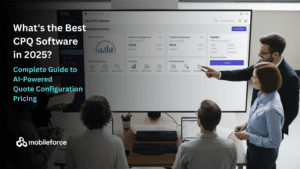

Mobileforce
- Blog, General Resources
Table of Contents
TogglePicture This: Your Sales Rep Just Lost Another Deal Because of a Spreadsheet
Your top sales rep spent three hours yesterday crafting what should have been a slam-dunk quote. Complex product mix? Check. Competitive pricing? Double-check. Customer ready to sign? Absolutely. Then disaster struck—a single mistyped discount percentage in row 47 of their Excel masterpiece torpedoed the entire margin structure.
Sound familiar? That’s the reality for thousands of B2B sales teams still wrestling with manual quoting processes. Configure Price Quote (CPQ) software exists to prevent exactly these kinds of expensive mistakes while turning your quoting process from a liability into a competitive weapon.
Here’s what CPQ actually does: it automates the entire process of building customer quotes from product selection through final document generation. Think of it as having a seasoned sales engineer who never sleeps, never makes calculation errors, and knows every product detail, pricing rule, and discount policy by heart.
The Three-Stage CPQ Process That Actually Works
Smart CPQ systems follow a logical three-step workflow that eliminates the guesswork:
1. Configure: Sales reps select products and customize solutions based on customer requirements. But here’s the key—the system prevents technically impossible combinations through built-in compatibility rules. No more discovering that Product A doesn’t work with Service B after the contract is signed.
2. Price: The pricing engine handles all the complex calculations your team currently juggles manually. Volume discounts, customer-specific pricing agreements, multi-currency support, promotional pricing—everything gets calculated automatically with zero margin for human error.
3. Quote: Professional documents generate instantly with product details, accurate pricing, terms and conditions, and your company branding. No more copying and pasting from five different spreadsheets or discovering formatting errors after the quote is sent.
The beauty of modern CPQ platforms lies in their no-code architecture. Your sales operations team can configure product catalogs, set up pricing schemes, and design approval workflows without calling IT every time something needs to change.
💡 See how CPQ could transform your quoting process. Schedule your demo →
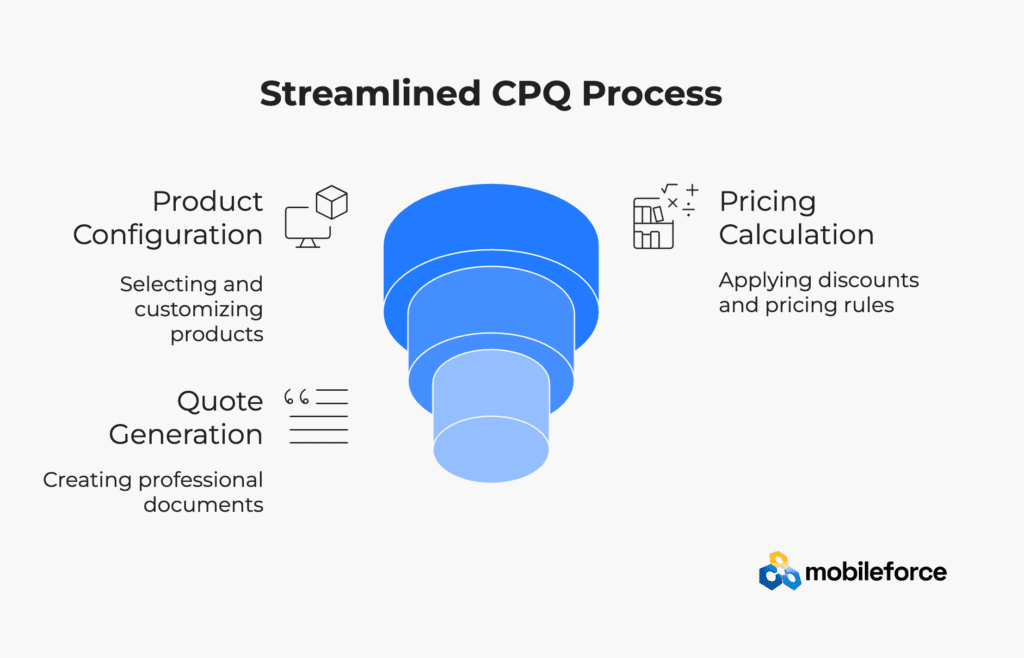
Why CPQ Systems Beat Manual Processes Every Time
Traditional quoting methods create bottlenecks at every handoff point. CPQ systems eliminate these friction points by connecting directly with your existing CRM platforms like HubSpot, Salesforce, or SugarCRM. Customer data, product information, and pricing rules stay synchronized across all systems.
The approval process becomes intelligent instead of bureaucratic. When quotes exceed discount thresholds, the system automatically routes them to appropriate managers or finance teams. No more deals dying in email chains or getting lost in approval limbo.
For field sales teams, mobile-optimized CPQ platforms offer offline capabilities that keep productivity high even in remote locations. Your reps can create and revise quotes on-site, then sync everything when connectivity returns. This functionality alone can cut days off your typical quote-to-close cycle.
The Strategic Value Beyond Quote Generation
CPQ systems provide sales guardrails that enforce pricing consistency across regions and channels. Audit trails maintain compliance records for revenue protection. Real-time integration with ERP systems validates inventory availability and customer information before quotes go out the door.
The result? Sales teams spend more time selling and less time managing spreadsheets. Customer experience improves through faster response times and professional, error-free proposals. And finance teams sleep better knowing pricing policies are being enforced automatically.
CPQ isn’t just about generating quotes faster—it’s about creating a sales process that scales with your business without scaling your headaches.
💡 See how CPQ could transform your quoting process. Schedule your demo →
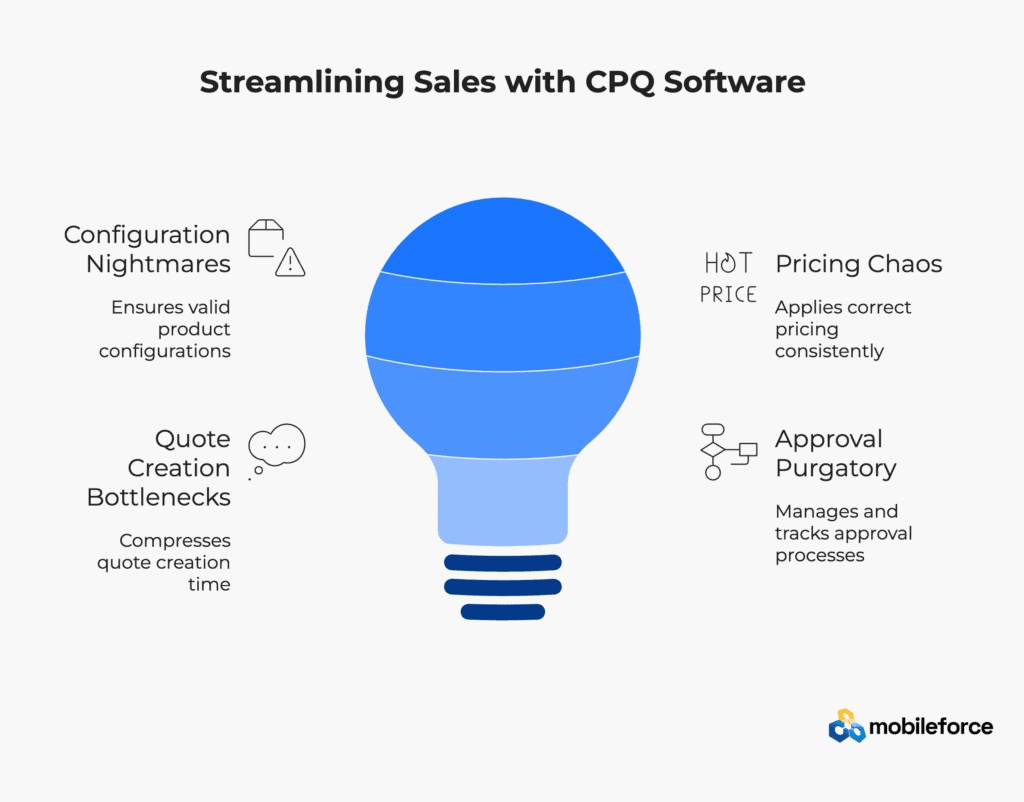
The Sales Productivity Crisis That’s Eating Your Revenue Alive
Here’s a sobering reality check: your sales team spends barely 36% of their time actually selling. The rest? Buried in spreadsheets, chasing approvals, and manually crafting quotes that should take minutes, not hours.
This isn’t just inefficiency—it’s a competitive death spiral. While your reps struggle with pricing calculations and product configurations, your competitors are closing deals with CPQ systems that turn complex quoting into a streamlined, error-free process.
The Speed Problem That’s Killing Your Deals
B2B buyers care more about sales interaction speed than price when making purchase decisions. Think about that for a moment. Your prospects will literally pay more for faster, more professional service. Yet most sales teams are stuck in manual quoting hell, taking days to deliver what should be instant.
Organizations that have escaped this trap report results that sound almost too good to be true:
• 8x faster quote production – Minutes instead of days
• 70% decrease in approval times – No more bureaucratic black holes
• 20% increase in lead-to-close rates – Speed converts to revenue
• 60% reduction in overall sales cycles – Deals close when they’re hot
Beyond Speed: The Hidden Costs of Manual Quoting
Speed is just the beginning. Manual quoting creates cascading problems throughout your sales organization. Pricing errors that kill margins. Approval bottlenecks that turn hot prospects cold. Information silos that force customers to repeat themselves across departments.
CPQ systems eliminate these pain points through intelligent automation. No more spreadsheet gymnastics. No more pricing mistakes that either lose deals or destroy profitability. No more quotes disappearing into approval purgatory while competitors win the business.
Field Sales Teams Need This Yesterday
Your field sales reps face unique challenges. They’re meeting prospects at manufacturing sites with spotty WiFi, trade shows with overloaded networks, and remote locations where connectivity is a luxury. Traditional systems abandon them exactly when they need support most.
Mobile-optimized CPQ platforms change the game entirely. Create quotes on-site, even offline. Sync when connectivity returns. Turn every customer interaction into a potential closing opportunity instead of a “let me get back to you” moment.
The Real Strategic Value: Getting Your Reps Back to Selling
Here’s what matters most: CPQ isn’t about making quoting faster—it’s about making your sales team more effective. When you automate the administrative nightmare of complex pricing and configuration, your reps can focus on what they do best: understanding customer needs and building relationships that close deals.
The math is brutal but clear. Every hour your sales team spends on administrative tasks is an hour they’re not selling. Every manual quote is a risk of errors, delays, and lost deals. Every approval bottleneck is a competitor’s opportunity.
The question isn’t whether CPQ makes sense—it’s how much longer you can afford to operate without it.
💡 See how CPQ could transform your quoting process. Schedule your demo →
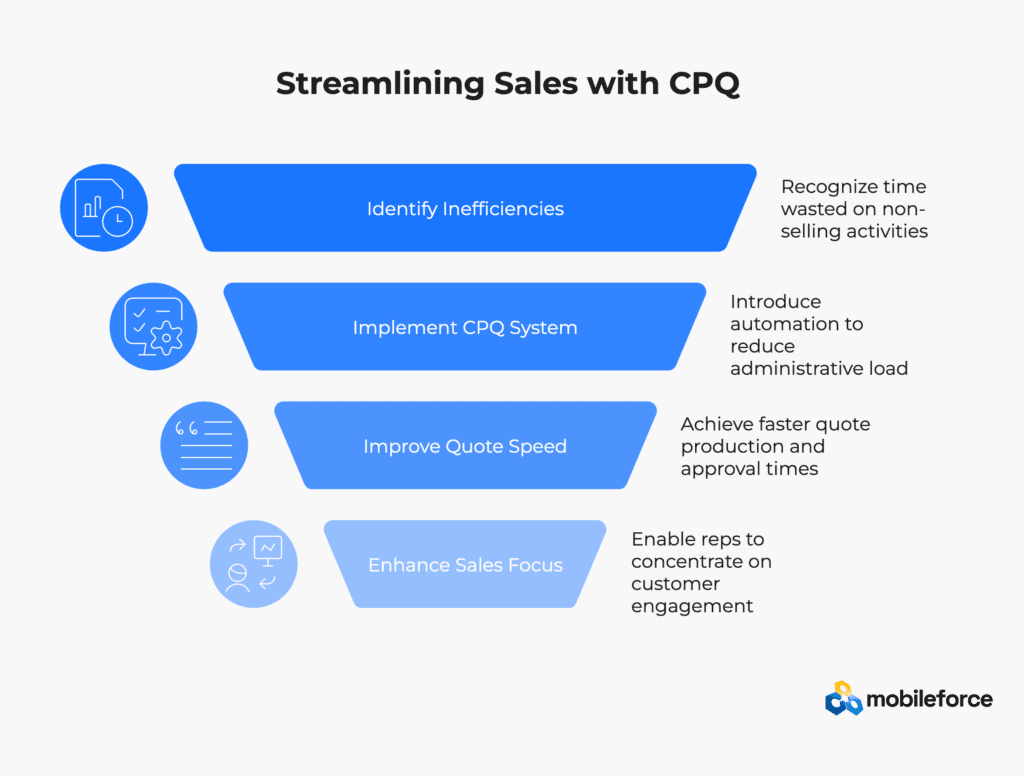
The CPQ Workflow: How Three Simple Steps Stop the Chaos
Picture this: your sales rep just received a complex product inquiry. Instead of diving into spreadsheet hell or playing phone tag with product specialists, they open their CPQ system and follow a surprisingly straightforward three-step dance.
Configure, Price, Quote. That’s it. Simple in concept, powerful in execution.
Configuration: Building the Perfect Solution (Without Breaking Anything)
Think of configuration as playing with the world’s most expensive set of building blocks—except these blocks know exactly which other blocks they can work with.
Your sales rep starts by selecting products from a centralized catalog. But here’s where things get interesting: the system acts like a protective parent, preventing technically impossible combinations before they happen. Try to configure a high-end processor with budget-tier memory? The system politely says “nope” and suggests compatible alternatives.
These guardrails work through predefined product relationships. Select a specific hardware component, and the system instantly filters available accessories to show only compatible options. It’s guided selling that prevents your reps from creating configurations that would make your engineering team weep.
For businesses with tiered offerings, the magic really shows. The interface adapts as users make selections—relevant options appear, irrelevant ones disappear. What starts as overwhelming complexity becomes a clean, logical progression.
💡 See how CPQ could transform your quoting process. Schedule your demo →
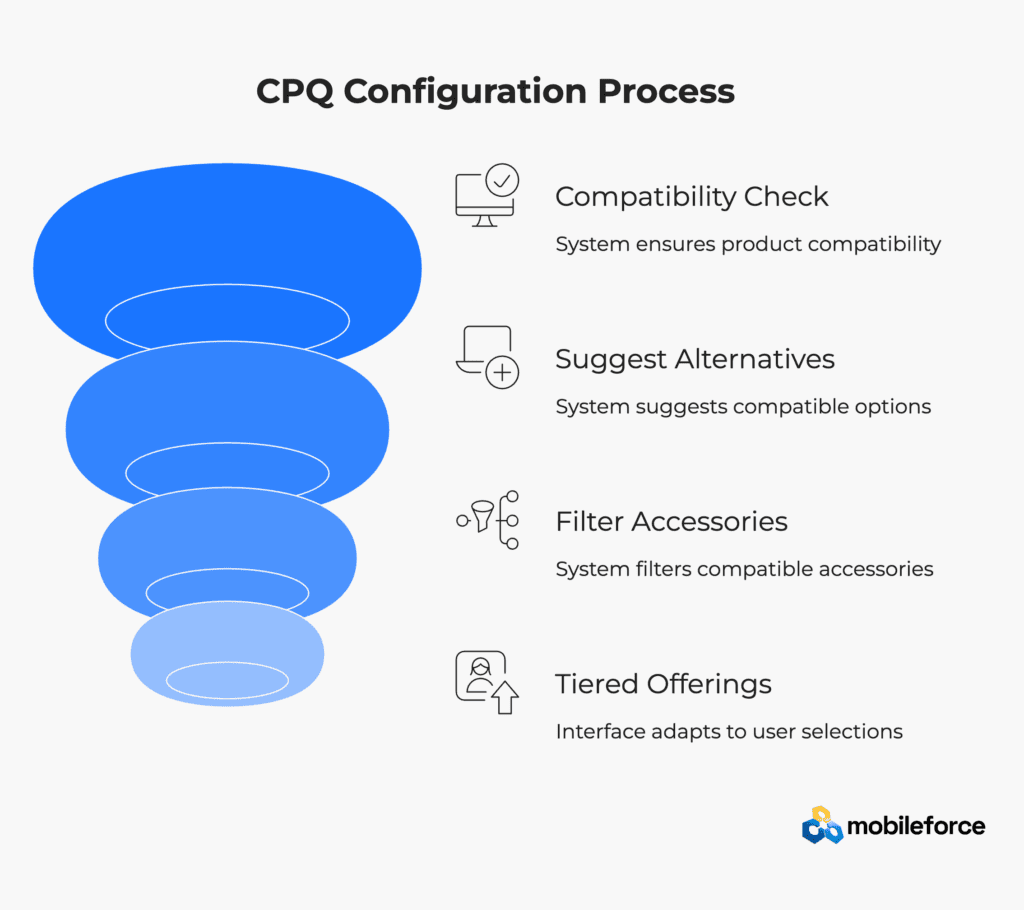
Pricing: Where Math Meets Reality
Configuration done? Now comes the fun part—or rather, the part that used to cause headaches and now just works.
The pricing engine juggles multiple variables simultaneously:
- Base product pricing
- Volume-based discounts
- Customer-specific pricing agreements
- Regional pricing variations
- Multi-currency support
- Promotional pricing
Here’s the beautiful part: these rules operate through a centralized engine that maintains pricing consistency across all sales channels. No more “well, Sarah quoted them 15% last time” guesswork.
When discounts exceed predefined thresholds, the system automatically triggers approval workflows. Your quote doesn’t disappear into email purgatory—it routes directly to the appropriate manager or finance team with all the context they need to make fast decisions.
Real-time integration with inventory systems ensures quotes reflect actual product availability. Some CPQ platforms even offer offline capabilities for field sales teams working in remote locations, because connectivity shouldn’t determine whether you can close a deal.
💡 See how CPQ could transform your quoting process. Schedule your demo →
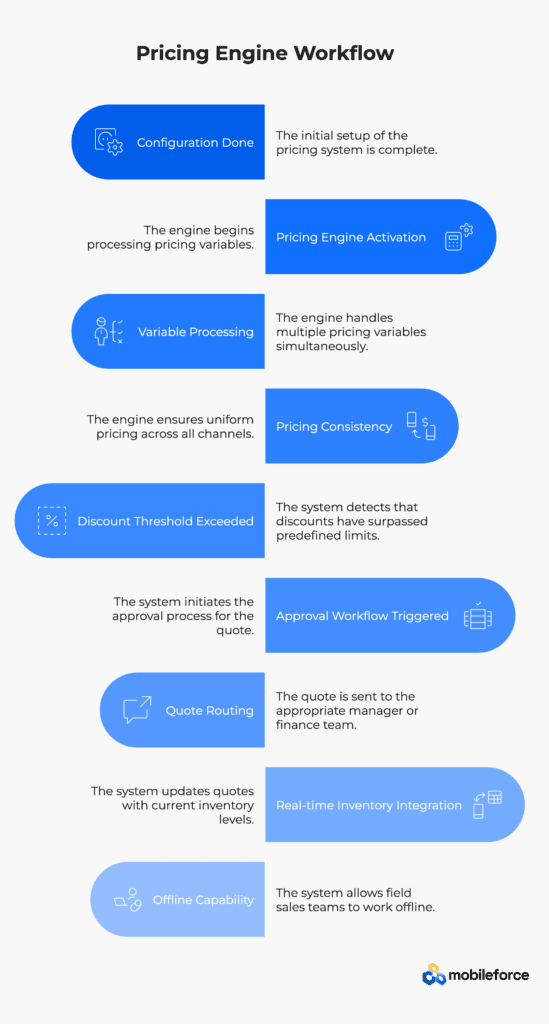
Quote Generation: From Data to “Where Do I Sign?”
The final step transforms all that configuration and pricing work into something your customer actually wants to see—a professional, branded quote document.
The system generates proposals that include:
- Product details and configurations
- Pricing information with appropriate discounts
- Terms and conditions
- Custom branding elements
- Electronic signature capabilities
For quotes requiring approval, automated workflows route documents to designated approvers based on discount levels, deal size, or whatever variables matter to your business. These approval pathways eliminate bottlenecks through automated notifications and clear visibility into approval status.
Once approved, quotes become available through multiple channels. Customers can access proposals via self-service portals or email links, creating a collaborative environment where buyers and sellers finalize details together. Many systems include eSignature integration for immediate acceptance—because why make customers print, sign, scan, and email when they can just click?
The entire process flows from initial product selection to signed contract without the traditional handoffs that create delays and errors. Your reps stay focused on the customer relationship while the system handles the technical complexity behind the scenes.
💡 See how CPQ could transform your quoting process. Schedule your demo →
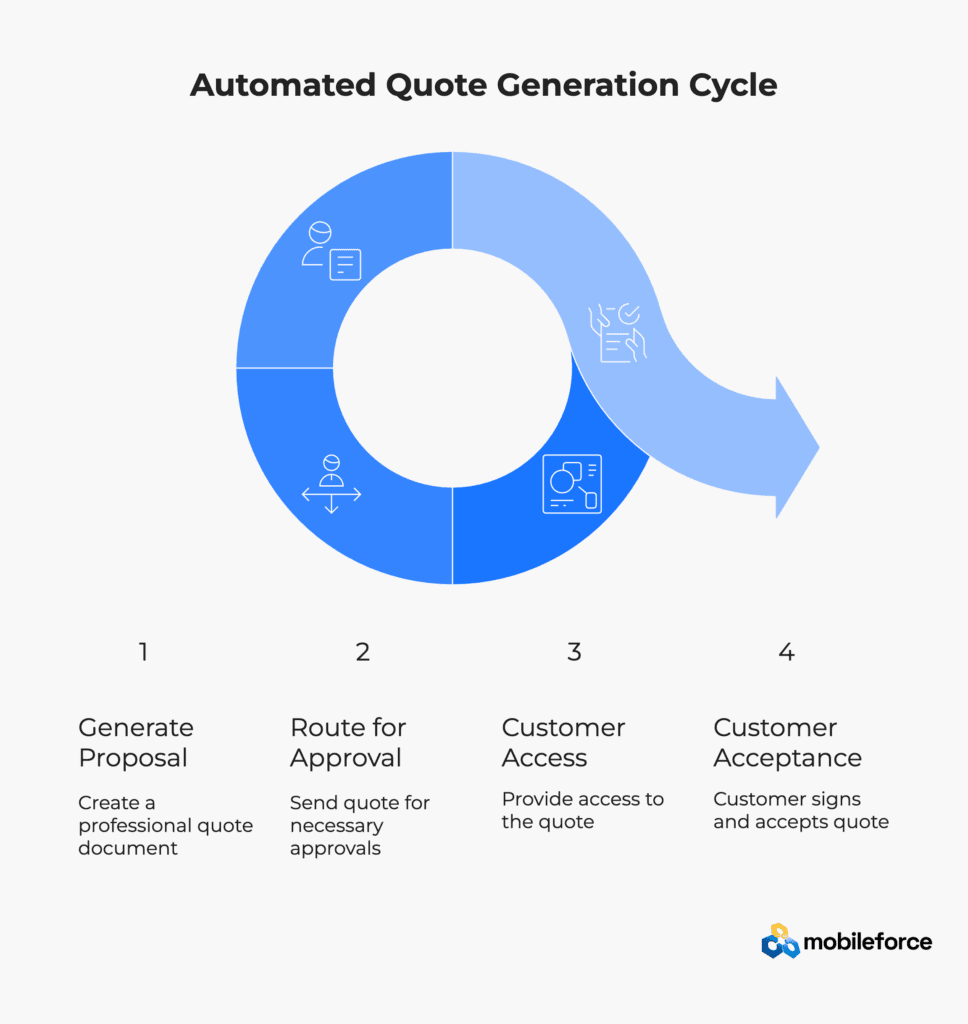
The Business Impact That Makes CPQ Investment a No-Brainer
Your sales rep just spent four hours building a quote in Excel, only to discover the pricing changed last week and the customer wants different configurations. Meanwhile, your competitor’s AI-powered CPQ system cranked out three accurate quotes in the time it took your team to open their spreadsheet. Guess who’s winning more deals?
Smart organizations don’t implement CPQ software because it’s trendy—they do it because the alternative is watching competitors eat their lunch while their teams drown in administrative quicksand.
Revenue Velocity That Actually Moves the Needle
Companies using CPQ software slice quote-to-cash cycles by up to 80%. That’s not just efficiency—it’s competitive warfare. While your team manually builds quotes, competitors are already collecting signatures and booking revenue.
The acceleration happens at the exact bottlenecks that kill deals: quote generation, approval processes, and document preparation. Multi-tier approval workflows automatically route quotes exceeding discount thresholds to appropriate managers. No more chasing down approvals through email chains where deals go to die.
Here’s what the numbers look like in practice: A manufacturing company reduced their quote cycle from 5 days to 2 hours. Their sales team went from generating 20 quotes per week to 80 quotes per week. More quotes mean more opportunities. More opportunities mean more revenue.
Pricing Accuracy That Protects Your Margins
Manual pricing errors don’t just embarrass your sales team—they hemorrhage profit. CPQ platforms eliminate the human error that turns profitable deals into margin disasters. Intelligent validation features catch pricing mistakes before they reach customers, preventing the awkward conversations about “revised pricing” that kill deal momentum.
Real-time integration with inventory systems prevents quotes for products you can’t actually deliver. Customer-specific pricing agreements get applied automatically, ensuring your enterprise clients always see their negotiated rates. Regional pricing variations, multi-currency support, and promotional pricing all happen automatically—no more hoping someone remembered to update the spreadsheet.
Customer Experience That Closes More Deals
Your prospects don’t care about your internal processes—they care about getting accurate quotes fast. CPQ delivers professional, error-free quotes faster than manual methods could ever manage. Self-service portals let customers review, accept, or reject quotes through branded interfaces without playing phone tag with your sales team.
Mobile-optimized solutions mean field sales reps can create or revise quotes on-site. Picture this: your rep is at a customer location, requirements change during the meeting, and they generate a new quote before leaving the parking lot. That’s not just efficiency—it’s the kind of responsiveness that wins deals.
Governance That Doesn’t Kill Deals
CPQ platforms create guardrails that enforce pricing policies without turning every deal into a bureaucratic nightmare. Audit trails maintain records for compliance and revenue protection. Role-based access controls ensure only authorized personnel can modify pricing or discount structures.
The beauty lies in intelligent automation. Standard discounts get approved automatically. Exceptional requests route to the right people with complete context. No more deals stalling because someone forgot to forward an email.
Sales Productivity That Actually Matters
Sales reps spending 64% of their time on administrative tasks instead of selling? That’s not a productivity problem—that’s a business emergency. CPQ automation liberates teams from spreadsheet maintenance, manual calculations, and approval chasing.
When the system handles complex pricing logic automatically, sales professionals focus on relationship-building activities that drive revenue growth. The result? More time prospecting, more time with customers, and more time closing deals instead of formatting documents.
The compound effect is powerful: Faster quotes lead to shorter sales cycles. Fewer errors mean happier customers. Better compliance protects margins. Higher productivity increases revenue per rep. It’s not just about quoting—it’s about creating a sales advantage that competitors can’t match.
💡 See how CPQ could transform your quoting process. Schedule your demo →
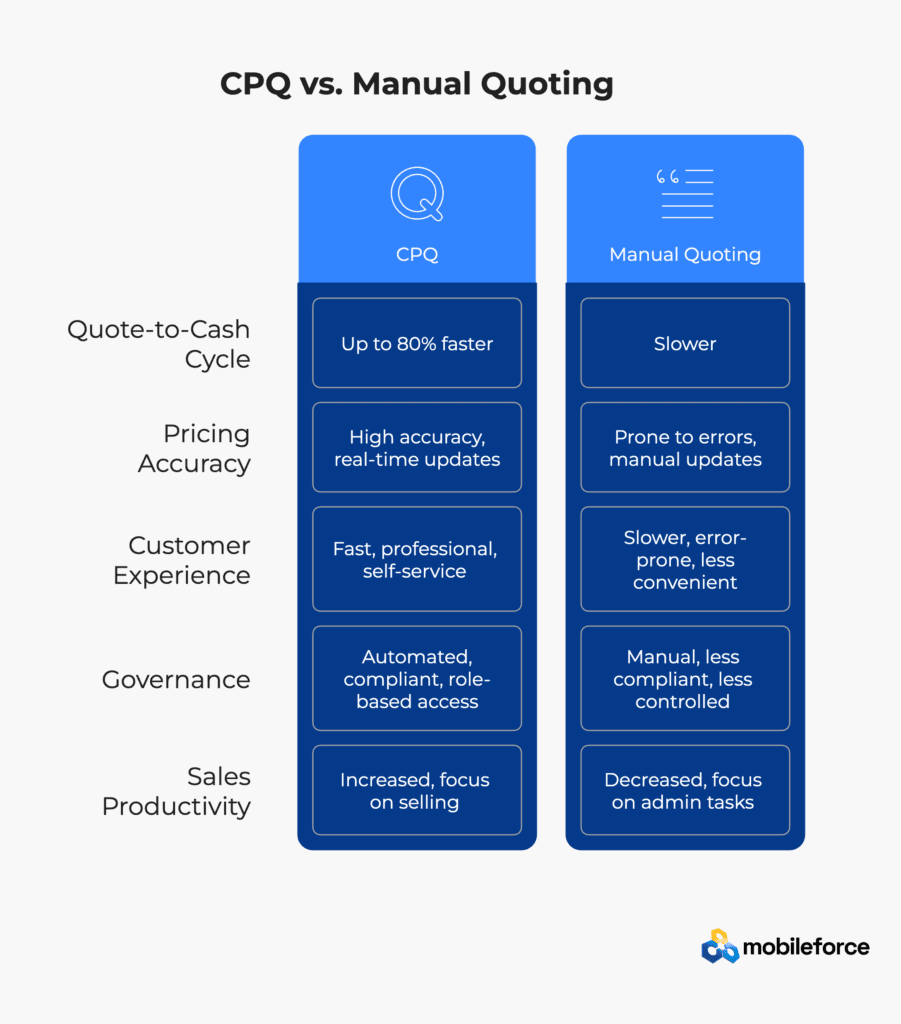
Getting CPQ Right: The Implementation Roadmap That Separates Winners from Expensive Mistakes
Here’s the uncomfortable truth about CPQ implementations: most organizations rush into software selection before understanding what they’re trying to fix. You wouldn’t renovate your kitchen without measuring the space first, yet countless companies pick CPQ solutions based on feature lists instead of actual business requirements.
The companies that nail CPQ implementation? They follow a methodical approach that treats technology as the solution, not the starting point. Studies consistently show that organizations with proper implementation planning see up to 80% reduction in quote generation time, while those that skip the groundwork often struggle with user adoption and expensive do-overs.
Map Your Current Reality Before Buying Anything
Most sales teams operate on what we politely call “tribal knowledge”—informal processes that exist in people’s heads rather than documented workflows. This approach works fine until you try to automate it.
Before evaluating CPQ vendors, spend time mapping your actual sales process. Not the idealized version from your company handbook, but the messy reality of how deals actually flow through your organization. Document approval hierarchies, discount thresholds, and configuration rules. Understanding these patterns creates the blueprint for implementation success.
Here’s what kills CPQ projects: assuming your current process is broken and needs complete overhaul. Sometimes it does. Often, it just needs intelligent automation around existing workflows that already work.
Integration Isn’t Optional—It’s Everything
Your CPQ system will live or die based on how well it connects with your existing tech stack. Period.
The most successful deployments feature seamless, bidirectional integration between CPQ and CRM/ERP systems. This isn’t about checking a box on a requirements list—it’s about creating a unified data environment where information flows naturally between systems without manual intervention.
Real-time inventory checks prevent embarrassing situations where you’re quoting products that don’t exist. Customer data synchronization ensures your quotes reflect current account information. Quote-to-cash automation eliminates the handoff delays that traditionally plague complex sales organizations.
Pay special attention to mobile capabilities if you have field sales teams. These reps need to create and modify quotes in environments where internet connectivity ranges from spotty to nonexistent. The best CPQ platforms handle offline scenarios gracefully, syncing data when connections become available.
User Adoption: The Make-or-Break Factor
Even the most sophisticated CPQ system becomes expensive shelf-ware if your sales team won’t use it. User adoption represents the primary determinant of implementation success, and it’s where most organizations stumble.
The key insight? People resist change when they perceive it as additional work. They embrace change when they see clear personal benefits. Focus training on practical advantages: faster quote production, fewer pricing errors, simplified approval processes. Show, don’t tell.
Identify internal champions early—sales reps who grasp the benefits quickly and can influence their colleagues. These advocates become your implementation allies, providing peer support that’s often more effective than formal training programs.
Avoid the temptation to train everyone on every feature. Start with core functionality that delivers immediate value, then expand capabilities as users become comfortable with the system.
Think Marathon, Not Sprint
The organizations that achieve the best CPQ outcomes implement incrementally rather than attempting comprehensive deployment on day one. This phased approach reduces risk while building momentum through early wins.
Start with your most critical use cases—the quoting scenarios that happen frequently and cause the most pain. Get those working smoothly before expanding to edge cases and complex configurations. This approach lets you iron out integration issues and refine workflows before rolling out to your entire sales organization.
Each phase should have clear success metrics and stakeholder feedback loops. What’s working? What needs adjustment? How can workflows be optimized? This iterative refinement creates better outcomes than trying to perfect everything upfront.
Smart implementation partners understand this philosophy. They help you identify appropriate milestones for each phase and design workflows tailored to your specific business requirements rather than forcing you into their standard template.
The payoff for this methodical approach? Faster user adoption, fewer expensive revisions, and CPQ systems that actually enhance your sales process rather than complicating it.
💡 See how CPQ could transform your quoting process. Schedule your demo →
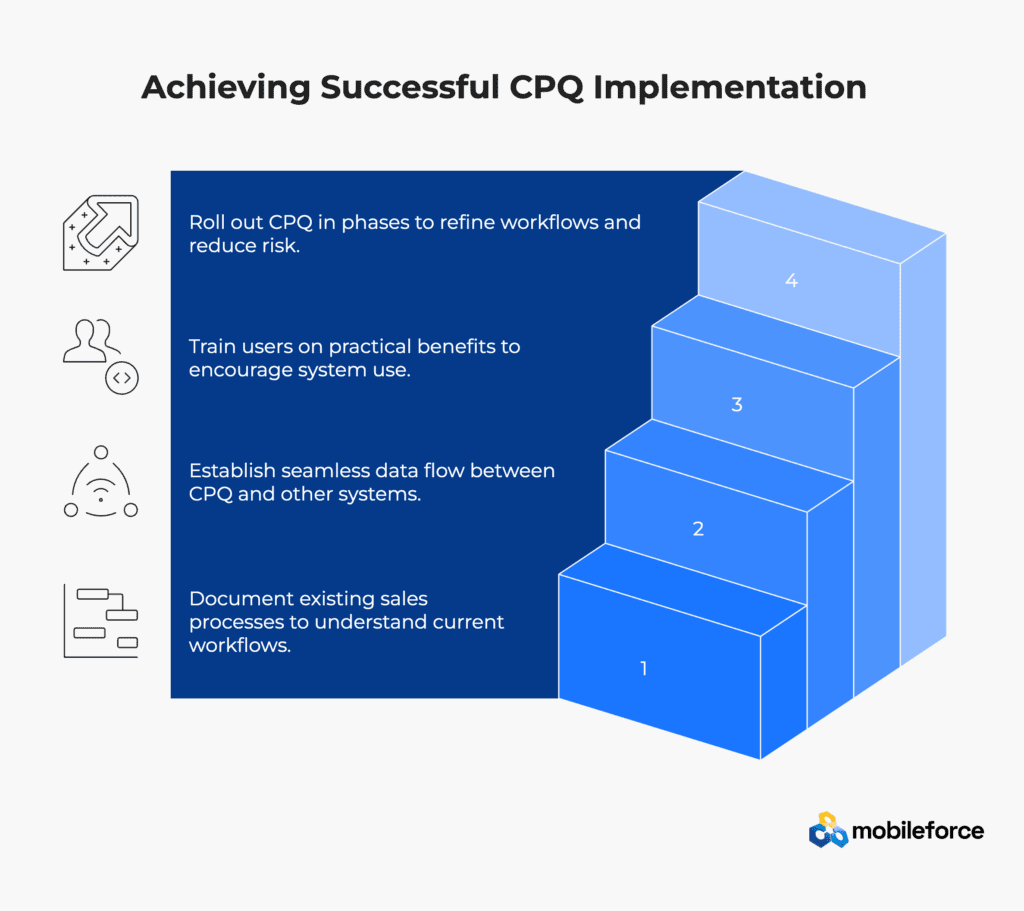
Mobileforce: The CPQ Solution That Actually Works the Way Sales Teams Think
Here’s what separates the wheat from the chaff in the CPQ world: most solutions force your sales process to bend around their rigid architecture. Mobileforce flips that script entirely.
What Sets Mobileforce Apart:
Instead of months-long implementations that require armies of consultants, Mobileforce delivers a no-code platform that adapts to your existing workflows. Your sales team doesn’t need to learn a new way of working—the system learns how they already work and enhances it.
AskCPQ™: Your AI-Powered Sales Co-Pilot
Picture this: your sales rep is in the middle of a complex deal and needs to generate a quote for a 500-employee manufacturing company with specific integration requirements. Instead of hunting through product catalogs and running mental calculations, they simply ask: “I need a quote for manufacturing tier with 500 seats, premium support, and HubSpot integration under $50K.”
AskCPQ™ processes that request, evaluates configurations against your pricing rules, and delivers intelligent options in seconds. It’s not just faster—it’s fundamentally smarter than traditional configure-price-quote workflows.
Built for Real Sales Teams
The platform recognizes that different people need different capabilities:
- Sales Reps generate quotes without leaving their CRM (HubSpot, Salesforce, you name it)
- Sales Managers handle approvals through automated workflows that actually make sense
- Field Teams create quotes on-site, even when the WiFi is terrible
- Administrators configure everything without calling IT every time they need a simple change
Implementation That Doesn’t Require a PhD
You know what’s revolutionary? CPQ software that doesn’t take six months to deploy. Mobileforce’s phased approach starts with core functionality and expands as your team gets comfortable. No big-bang rollouts that paralyze your sales operation.
The system maintains audit trails for compliance while providing real-time integrations with your ERP systems. Everything stays synchronized without the fragility that plagues most enterprise integrations.
Collaborative Quoting That Actually Increases Close Rates
Here’s something most CPQ vendors miss: your prospects want to be part of the quoting process. Mobileforce’s branded portals let buyers and sellers collaborate on quotes, with eSignature integration that closes deals faster than traditional back-and-forth email chains.
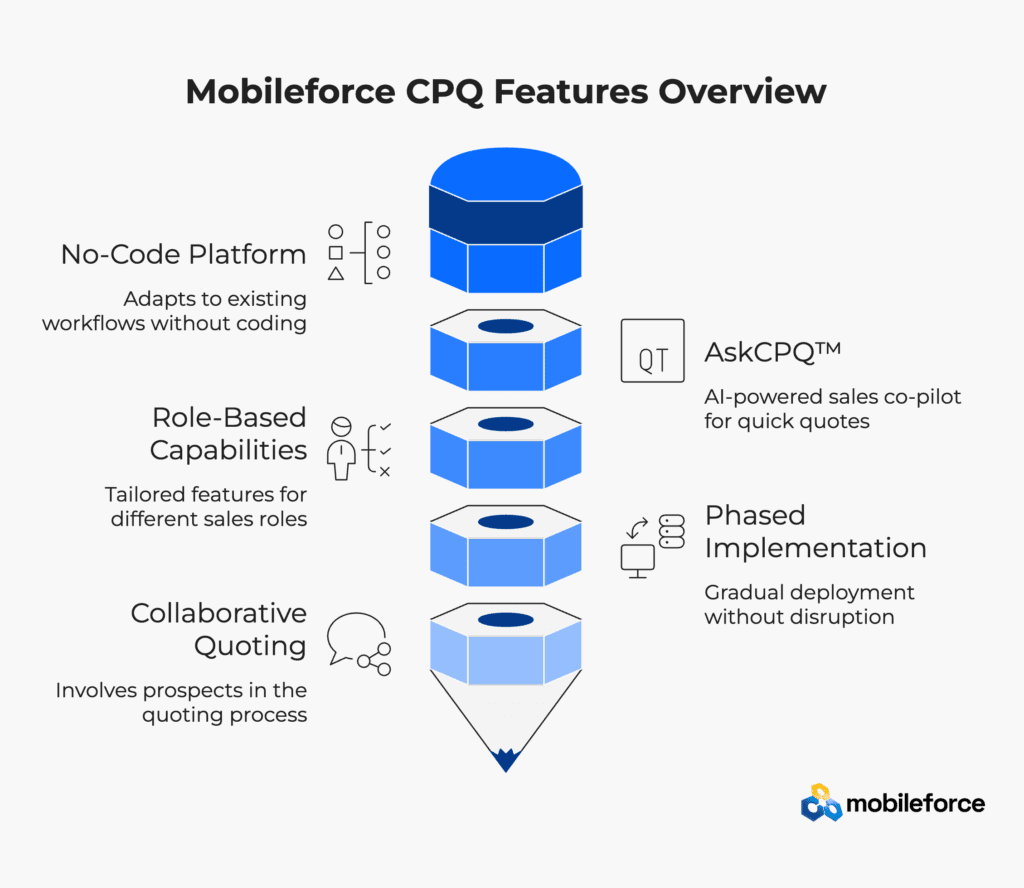
🚀 Ready to see how Mobileforce handles your specific quoting challenges? Get your personalized demo today →
Key Takeaways
CPQ (Configure Price Quote) software transforms complex sales processes by automating product configuration, pricing calculations, and quote generation, helping sales teams focus on relationship-building rather than administrative tasks.
• CPQ systems reduce quote generation time by up to 80% and decrease sales cycles by 60% through automated workflows and approval processes.
• The three-stage CPQ process—Configure, Price, Quote—ensures technical compatibility, accurate pricing, and professional document generation while preventing costly errors.
• Successful CPQ implementation requires defining sales processes first, ensuring CRM/ERP integration, comprehensive user training, and phased rollout strategies.
• Modern CPQ solutions offer mobile capabilities and AI-powered features that enable field sales teams to create quotes on-site and accelerate quote-to-cash cycles.
• Organizations benefit from improved compliance through automated guardrails, audit trails, and role-based access controls that maintain pricing consistency across channels.
When properly implemented, CPQ software serves as a strategic sales enablement tool that not only speeds up quoting processes but also enhances customer experience through faster response times and professional, error-free proposals.
💡 See how CPQ could transform your quoting process. Schedule your demo →
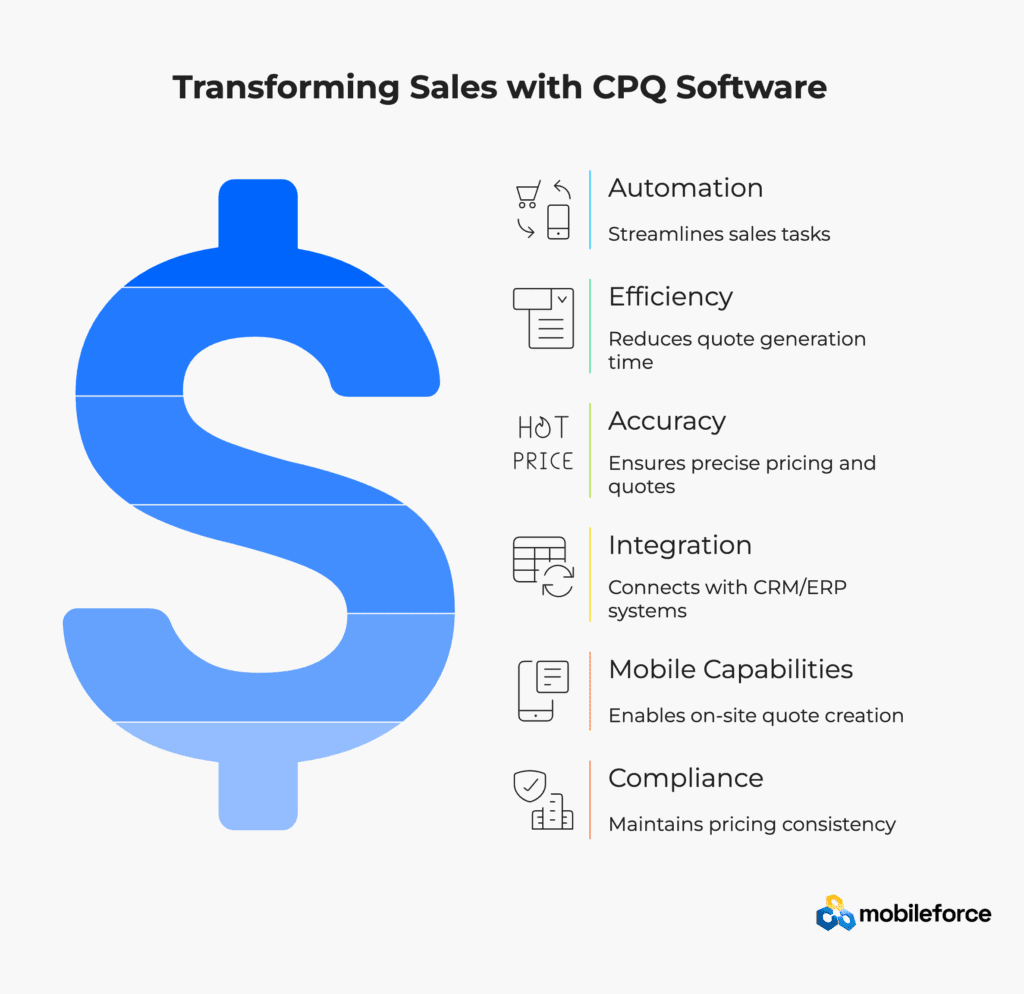
FAQs
Q1. What is CPQ software and how does it benefit businesses? CPQ (Configure, Price, Quote) software is a solution that automates product configuration, pricing calculations, and quote generation for complex sales processes. It benefits businesses by reducing quote generation time by up to 80%, decreasing sales cycles by 60%, and allowing sales teams to focus more on relationship-building rather than administrative tasks.
Q2. How does the CPQ process work? The CPQ process follows a three-stage approach: Configure (selecting and customizing products), Price (applying pricing logic and discount rules), and Quote (generating professional quote documents). This process ensures technical compatibility, accurate pricing, and error-free quotes while streamlining the entire sales workflow.
Q3. What are the key features of a modern CPQ solution? Modern CPQ solutions typically include mobile capabilities for field sales teams, AI-powered features for faster quote generation, integration with CRM and ERP systems, automated approval workflows, and self-service portals for customers. They also offer no-code or low-code interfaces for easy configuration and management.
Q4. How can a company successfully implement a CPQ system? Successful CPQ implementation involves defining sales processes first, ensuring integration with existing CRM and ERP systems, providing comprehensive user training, and adopting a phased rollout approach. It’s also crucial to monitor and refine workflows continuously for optimal performance.
Q5. What improvements can businesses expect after implementing CPQ software? After implementing CPQ software, businesses can expect faster quote-to-cash cycles, fewer pricing errors, improved customer experience, better compliance and governance, and increased sales productivity. Many organizations report up to 80% reduction in quote generation time and significant improvements in lead-to-close rates.




